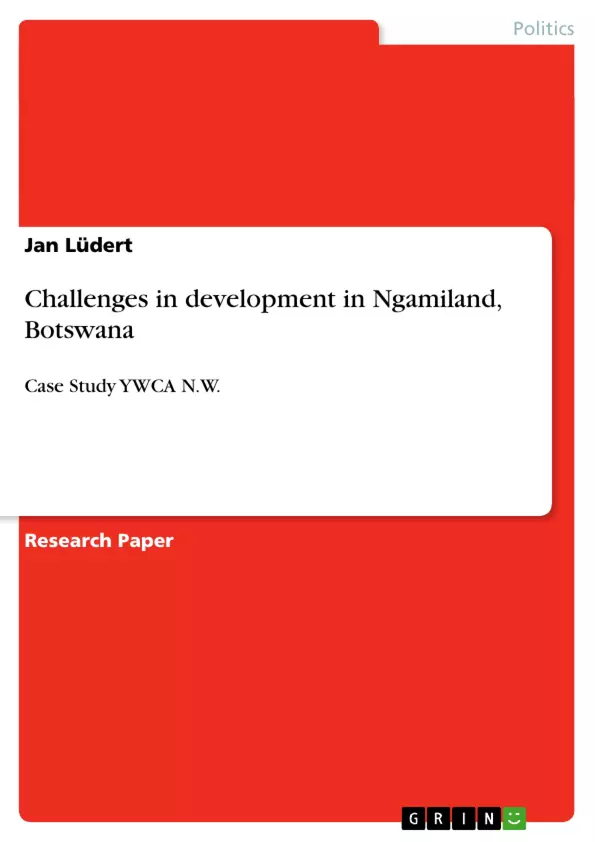Applying a rather realistic perspective to Botswana leads to the
question of sustainable development supported by governments as well as
non-governmental organizations. The Young Women Christian
Association of Ngamiland (YWCA) in the North West of the country will
act as a case to determine the challenges of development on the grass
roots level in transformation countries in general and Botswana and particular. The case study acts as a guide for development efforts in grass root level organization.
Inhaltsverzeichnis (Table of Contents)
- I. INTRODUCTION
- II. METHODOLOGY AND OBJECTIVES
- III. YWCA A DEVELOPMENT AGENCY
- IV. FINDINGS OF STAKEHOLDER AND MEMBERSHIP SURVEY
- IV.A Stakeholder Survey
- IV.B Membership Survey
- V. PERIPHERAL IMPACTS OF DEVELOPMENT IN BOTSWANA
- VI. A NEW VISION FOR YWCA NORTH WEST
Zielsetzung und Themenschwerpunkte (Objectives and Key Themes)
This case study examines the challenges of development in Ngamiland, Botswana, focusing on the role of the Young Women's Christian Association (YWCA) in promoting sustainable livelihoods and community participation. The study seeks to understand the impact of national development initiatives on the grassroots level, particularly in a region marked by poverty and the prevalence of HIV/AIDS.
- Challenges of development in a rural context
- Impact of HIV/AIDS and poverty on rural communities
- Role of NGOs in promoting sustainable development
- Community participation and good governance
- The history and cultural context of Ngamiland
Zusammenfassung der Kapitel (Chapter Summaries)
- I. Introduction: This chapter provides an overview of the socio-economic challenges facing Botswana, highlighting the country's success in economic growth and good governance, while simultaneously addressing the persisting issue of poverty in rural areas and the impact of the HIV/AIDS pandemic. The chapter introduces Ngamiland as a case study region, emphasizing the need for understanding the challenges of development at the grassroots level.
- II. Methodology and Objectives: This chapter outlines the research methodology employed in the case study and defines the specific objectives of the investigation. It provides a framework for understanding the data collected and the key questions addressed in the analysis.
- III. YWCA A Development Agency: This chapter delves into the role of the Young Women's Christian Association (YWCA) as a development agency, examining its mission, objectives, and activities in the North West region of Botswana. The chapter explores the YWCA's commitment to improving the quality of life for its members and surrounding communities through social, economic, and spiritual development initiatives.
- IV. Findings of Stakeholder and Membership Survey: This chapter presents the results of surveys conducted among stakeholders and members of the YWCA, providing insights into their perspectives on development challenges, the impact of YWCA programs, and their recommendations for future initiatives. The chapter offers valuable information about the needs and priorities of the communities the YWCA serves.
- V. Peripheral Impacts of Development in Botswana: This chapter explores the broader impact of development initiatives in Botswana, particularly their effects on rural communities. It examines the potential for unintended consequences, such as rural-urban migration and the erosion of traditional cultural practices.
Schlüsselwörter (Keywords)
This study focuses on the challenges of development, sustainable livelihoods, community participation, good governance, HIV/AIDS, poverty, rural development, Ngamiland, Botswana, YWCA, stakeholder engagement, and the impact of development initiatives on local communities.
- Quote paper
- Jan Lüdert (Author), 2004, Challenges in development in Ngamiland, Botswana, Munich, GRIN Verlag, https://www.grin.com/document/90073



